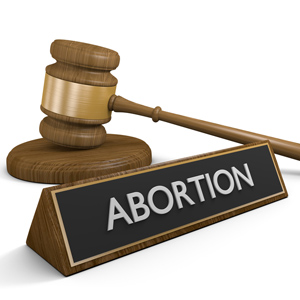Abortion 'abolitionists' seek equal protection rights for fetuses, prosecutions of women

Image from Shutterstock.
State abortion bans that followed the U.S. Supreme Court’s decision to overturn Roe v. Wade didn’t go far enough for some opponents of the procedure.
Abortion “abolitionists” disagree with states’ approach to punish abortion providers without punishing women. They think that women who have abortions should be prosecuted for homicide, potentially exposing them to the death penalty, the New York Times reports.
The abolitionists also want to give fetuses equal protection rights under the 14th Amendment. Conservative legal scholar Erika Bachiochi, a fellow at the Ethics and Public Policy Center, a conservative think tank, backed that approach in a guest essay for the New York Times.
“Making this constitutional case will require rejecting the concept that a rights-bearing person is fundamentally self-owning and autonomous,” Bachiochi wrote. “Indeed, it is precisely the unborn child’s state of existential dependence upon its mother, not its autonomy, that makes it especially entitled to care, nurture and legal protection too.”
Writing May 25 at Balls and Strikes, which publishes commentary and reporting about courts, judges and the legal system, lawyer Lisa Needham elaborates on the legal personhood theory. Giving fetuses 14th Amendment rights would give them the right to procedural due process, as well as equal protection under the law, Needham said.
“Judicial adoption or legislative codification of fetal personhood … would not only restrict (if not outright bar) pregnant people even in blue states from getting an abortion, but would also require them to change their behavior to protect the full-fledged person housed within them,” Needham wrote.
Equal rights for fetuses could put some kinds of birth control under legal scrutiny and could ban fertility treatments that create excess fertilized eggs, Needham said.
Fetal personhood could also lead to court-ordered medical treatment for pregnant women, wrote Rebecca Kluchin, a professor at the California State University at Sacramento, for the Washington Post on May 12.
An Alabama law that was eventually struck down provided an example of procedural due process, according to Balls and Strikes. Under the law, judges could appoint a lawyer for the fetus when minors sought abortions without parental consent. The lawyer could cross-examine the minor and call witnesses.
The New York Times spoke with abortion abolitionist Jeff Durbin, a pastor in the greater Phoenix area and leader of End Abortion Now, which started in 2017. His YouTube channel has more than 300,000 subscribers. He preaches online, promotes bills that would allow women to be charged with homicide for their abortions, and trains churchgoers on how to prevent women from entering abortion clinics.
“I do believe that the unjustified taking of human life, if provable, ultimately, justly, ought to be capital punishment,” Durbin told the New York Times.
Write a letter to the editor, share a story tip or update, or report an error.



